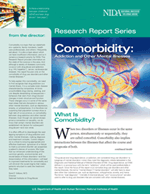
|
For Release January 6, 2009
A Critical Issue Highlighted at the First NIH Meeting on Substance Abuse Among Military Personnel and Their Families
 WASHINGTON, D.C. -- The National Institute on Drug Abuse (NIDA), part of the National Institutes of Health, today released a research report, Comorbidity: Addiction and Other Mental Illnesses, summarizing the state of the science regarding the complex relationship between substance abuse and other mental disorders. The release of this report is timely given the increasing prevalence and link between post traumatic stress disorder and substance abuse, to be discussed today at a NIDA sponsored meeting, Addressing Substance Abuse and Comorbidities Among Military Personnel, Veterans and Their Families.
WASHINGTON, D.C. -- The National Institute on Drug Abuse (NIDA), part of the National Institutes of Health, today released a research report, Comorbidity: Addiction and Other Mental Illnesses, summarizing the state of the science regarding the complex relationship between substance abuse and other mental disorders. The release of this report is timely given the increasing prevalence and link between post traumatic stress disorder and substance abuse, to be discussed today at a NIDA sponsored meeting, Addressing Substance Abuse and Comorbidities Among Military Personnel, Veterans and Their Families.
For the past 20 years, national surveys have documented the high prevalence of drug abuse among individuals diagnosed with other mental illnesses and vice versa. For example, studies show that people diagnosed with mood or anxiety disorders are about twice as likely to also suffer from a drug use disorder, and the inverse is also true.
"We do not know enough yet to predict precisely whether one disorder will lead to the other(s) or how to prevent comorbidity," said NIDA Director Nora D. Volkow, M.D. "We do know, however, that the high rate of comorbidity means that we need a comprehensive approach to intervention that identifies, evaluates, and treats each disorder concurrently."
NIDA's research report, Comorbidity: Addiction and Other Mental Illnesses describes common factors that can lead to comorbidity, including genetic and gender vulnerabilities, involvement of similar brain regions, and the influence of developmental factors; and discusses how comorbidity can be diagnosed and treated. Several examples of behavioral therapies tested in patients with comorbid conditions--as well as potential medications--are outlined in the research report.
The comorbidity research report also highlights some of the challenges of treating these conditions concurrently. Moreover, the unique needs of returning military personnel and their families may demand novel approaches. To address these concerns, NIDA is convening a meeting to gain a better understanding of the prevention and treatment needs regarding substance abuse and related disorders among military personnel and their families. This will include a discussion of current prevention and treatment approaches; as well as promising interventions that may be adapted for this population. The goal of the meeting is to formulate a research agenda for conducting substance abuse prevention and treatment in military populations.
The two-day meeting, Addressing Substance Abuse and Comorbidities Among Military Personnel, Veterans and Their Families, is sponsored by NIDA in collaboration with the U.S. Army Medical Research and Materiel Command, the Department of Defense Health Affairs, the National Institute of Mental Health, the National Institute on Alcohol Abuse and Alcoholism, the National Heart, Lung and Blood Institute, and the National Cancer Institute.
To learn more about addiction and other mental illnesses, or to receive the Comorbidity: Addiction and Other Mental Illnesses Research Report, free of charge (in English or Spanish), visit the NIDA website at www.drugabuse.gov or contact DrugPubs, NIDA's Research Dissemination Center, at 1-877-NIDA-NIH (1-877-643-2644) or 1-240-645-0228 (TDD). Order requests can also be emailed to: drugpubs@nida.nih.gov.
The National Institute on Drug Abuse is a component of the National Institutes of Health, U.S. Department of Health and Human Services. NIDA supports most of the world's research on the health aspects of drug abuse and addiction. The Institute carries out a large variety of programs to inform policy and improve practice. Fact sheets on the health effects of drugs of abuse and information on NIDA research and other activities can be found on the NIDA home page at www.drugabuse.gov. To order publications in English or Spanish, call NIDA's new DrugPubs research dissemination center at 1-877-NIDA-NIH or 240-645-0228 (TDD) or fax or email requests to 240-645-0227 or drugpubs@nida.nih.gov.
The National Institutes of Health (NIH) - The Nation's Medical Research Agency - includes 27 Institutes and Centers and is a component of the U.S. Department of Health and Human Services. It is the primary Federal agency for conducting and supporting basic, clinical and translational medical research, and it investigates the causes, treatments, and cures for both common and rare diseases. For more information about NIH and its programs, visit www.nih.gov.
|

|

For more information about any item in this Release Contact:
- Dorie Hightower or
Stephanie Older
301-496-1545
media@nida.nih.gov
- Main Press Office:
301-443-6245
|
|